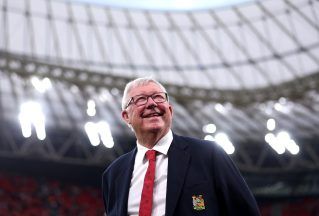In the wake of Scotland’s win over Israel at Hampden, Steve Clarke spoke about the players having a “big chance” to make “a small piece of history”.
The manager wasn’t talking about what he had just seen, when Kenny McLean’s spot kick had sealed victory in the national team’s first ever shoot-out, but was already looking ahead to next month’s play-off final when a win against Serbia would seal a place in the Euro 2020 finals.
Nobody needs reminding that Hampden is one of the host venues for the tournament and Scotland would play two finals games (hopefully) in front of a home crowd. Nor that the third group game would be against England at Wembley, the oldest international fixture played anew on a massive stage. And there’s certainly nobody who needs told again that qualification would end an exile from the major tournaments that stretches back to 1998.
So when Clarke says reaching that goal would be a “small” piece of history, it’s fair to say it might be worth a line or two whenever anyone writes the story of the national team. And when the Scotland boss says there’s a “big” chance of beating Serbia the initial reaction is that he’s more optimistic than given credit for.
That’s partly because, the thrilling conclusion aside, the match against Israel was not pleasant viewing. Allowances have to be made for having six players missing after injury and coronavirus testing forced months of planning to be rethought at the last moment.
Still, Scotland’s performance was full of energy but lacking in any sparkle or magic that could conjure up a goal. It took 72 minutes before anyone registered a shot on target and it wasn’t Clarke’s side but Israel who tested a keeper. Ofir Marciano in the Israel goal was relatively untroubled throughout normal and extra time.
Many were concerned when the team sheets were published and it looked like a three-man central defence was planned. Those who had seen shaky performances in the previous two games where the formation had been trialled found themselves hopefully suggesting alternatives that would fit the names on the page. “Maybe it’s a 4-4-2 with McTominay in a diamond midfield instead of defence?” “Perhaps it’s a 4-3-3 with McGregor playing high on the left?”
It was a 3-5-2 and Scott McTominay was in defence but this time it worked better than in the rehearsals. Creativity and inspiration may have been lacking but there was a solidity about Scotland and that has more value than swashbuckling style in knockout football.
It was a reminder of Clarke’s pragmatic approach and why despite some critics there’s now a six-game unbeaten run to defend.
The ‘steady as she goes’ approach could be a blessing up against the Serbia team Clarke will spend his next month preparing to face.
Few of us expected it to be Serbia. Norway’s recent run and the emergence of some star players had them looking like the rising power, not only backed to see off the Serbs but to slay Scotland as well. Erling Haaland was already pencilled in to be the bogeyman the Tartan Army went to bed fearing.
A double for Sergej Milinkovic-Savic in their play-off means he will fill that role now. Serbia had travelled to Oslo under the radar. Now they stand in Scotland’s path with dangerous intent after their 2-1 win over a much more fancied opponent.
So there’s plenty for the pessimists to feed on, and the last couple of decades has helped plenty of us to shape a gloomy demeanour wherever international football is concerned.
That shouldn’t blind anyone to the fact that Serbia have flaws like any other team, and aren’t among the elite. The simple fact that they are in the play-offs is proof of that. The knockout, second-chance competition is itself a chance at redemption for the flawed and failed.
Serbia found themselves in the play-off draw after finishing third in their qualifying group. There’s no shame in finishing behind Ukraine and Portugal but results over the past two years show Scotland can travel knowing a win isn’t impossible.
Portugal scored four while winning in Serbia, Ukraine netted twice while earning a draw but it’s worth noting that Luxembourg scored twice in a 3-2 defeat there last November and Turkey managed a 0-0 draw just last month.
In a sense, with both teams going into next month’s showdown having finished third in their initial qualifying group and then grabbed a lifeline, it’s about whose reboot works best.
Serbia may have the most eye-catching result but prior to that was the draw with Turkey and a 3-1 loss in Russia. Clarke’s unbeaten run will be on the line twice before the trip to Belgrade but it will give opposite number Ljubisa Tumbakovic pause for thought.
The former Kilmarnock boss was recruited to bring results and, after a start that brought a win over Cyprus and then four consecutive defeats, they are there to be seen. Arguments are there to be had over performance but the results remain and nobody will care about points for style if we’re looking ahead to games against England, Czech Republic and Croatia next summer.
To achieve that, Clarke has to get everything right on November 12 and his work starts now. The double-header of Nations League matches in the next week will be a testing ground for ideas and a chance to look at some different options in personnel at a time when a quick rethink is now just one coronavirus test away.
Form, injuries, results between now and then will all change opinions on whether Scotland have a “big chance” to make history next month or a slim hope of ending their exile.
The sight of elated players racing to McLean after his winning penalty was a reminder that boundless joy and Scotland games aren’t mutually exclusive. All thoughts turn to Belgrade now and dreams of history being made.


 SNS Group
SNS Group

























